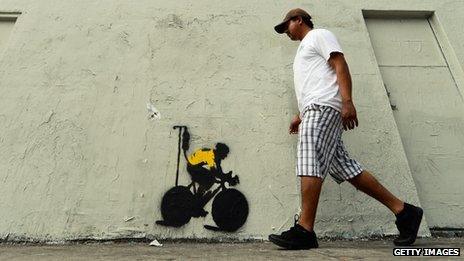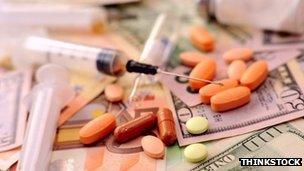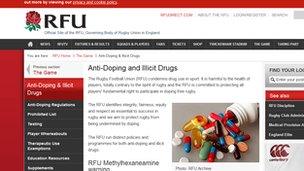Doping in sport: Counting the cost
- Published

The Lance Armstrong scandal shocked the world
The murky world of doping in sport burst onto the mainstream news agenda with a vengeance late last year with the Lance Armstrong scandal.
In a damning report, US anti-doping officials said the cyclist - who was stripped of seven Tour de France titles - had operated "the most sophisticated, professional and successful doping programme that sport has ever seen".
But while there are obvious sporting, social and health issues to doping, there are also major effects in the world of business and commerce, with sponsorship, TV rights, and employment issues being dragged into the mire.
Companies think twice about being associated with individuals or sports where there may be a doping culture.
In Armstrong's case, Nike, Budweiser brewer Anheuser-Busch and bike manufacturer Trek cut ties with the athlete.
"Businesses are becoming more savvy with their sports sponsorship deals now," says Andy Brown, editor of World Sports Law Report, and organiser of a recent Doping in Sport conference in London.
"A lot of firms are now putting mandatory clauses into their sponsorship contracts saying, for example, that if a sports person tests positive for drug taking then their contracts are null and void, and that all the money they have received from sponsors has to be returned."

Last year, Rabobank pulled out of cycling sponsorship after 17 years
He adds: "Even the hint of a doping scandal is enough for sponsors or television broadcasters to back off from a sport, as happened at the Tour de France when two German television stations pulled the plug because of doping allegations."
In 2008, TV stations ZDF and ARD pulled out of Tour coverage, with the latter saying "the sporting value of the Tour de France has been reduced by the accumulation of failed drugs tests".
And late in 2012, major Dutch bank Rabobank announced it would terminate the 17-year sponsorship of its professional team because it was "no longer convinced that the international professional world of cycling can make this a clean and fair sport".
Sportswear entrepreneur Jaimie Fuller, who runs compression wear firm Skins, told the London anti-doping conference firms such as his might pull of cycling unless there was a change of leadership of the International Cycling Union (UCI).
"We are talking about a death by a thousand cuts," he said, calling for an amnesty to bring the full extent of past doping in the sport into the open, and to provide a new start for cycling.
"It will go on and on and on and you don't need to be Albert Einstein to know that affects the commercial attractiveness to us sponsors," said Mr Fuller, a member of pressure group Change Cycling Now.
Backers 'wary'
One of the leading figures in the UK's fight against doping is Michele Verroken, former director of ethics and anti-doping at UK Sport, and founder of sports business consultancy Sporting Integrity.

Once a sport is tainted by drugs, "nagging doubts" remain for sponsors
She says sponsors, brands or broadcasters involved in a doping scandal face "huge potential damage".
She pointed to the action taken by trade association the World Federation of Sports Goods Industries (WFSGI), one of the main representatives of the bicycle manufacturing industry.
"Its members put clauses into their contracts with athletes and teams saying that doping would be in breach of contract," says Mrs Verroken.
"Sponsors have got responsibilities."
Where a whole sport suffers from repeated doping scandals it can also make potential commercial backers wary, she added.
"We have seen this with the current attitude to bankers and politicians. People get very cynical - and the same can happen in sport."
'Extraneous consequences'
One body which takes its responsibilities very seriously with regard to drug-testing and doping issues is the English Rugby Football Union (RFU).
"We do approximately 650 drug tests a season, and a further 350 tests out of season for illicit drug taking," the RFU's anti-drug programme leader, Stephen Watkins, told the anti-doping conference.

The RFU offers clear advice about drugs and its anti-doping rules and strategies
It is expanding its education programme among young players after three high-profile cases in 2012.
Last May, Hove's Bradley Parker, then 18, was banned for 15 months for using prohibited substances. Mr Watkins said the youngster's ban meant the start of his intended coaching apprenticeship was delayed.
"Often you hear about the length of time of a ban... but there are other extraneous consequences which kick in which young players often do not think about," he said.
The RFU has also launched a research project, in conjunction with Leeds Metropolitan University, looking into the attitudes of 16 to 18-year-old rugby players and getting their opinions on drug-taking and supplements.
"We have really taken the initiative, and are pushing very hard on the education issue," said Mr Watkins.
"It has always been part of the programme but I have gone round every academy... so that every player knows what the regulations are.
"I have also been to community clubs and community coaching. Ninety-nine per cent of players and coaches don't want drugs in sport, and are very receptive to what we are doing."